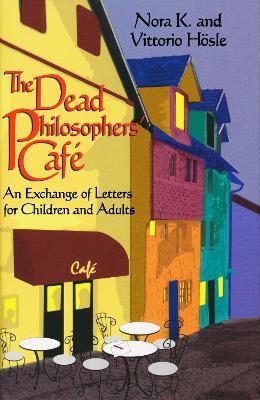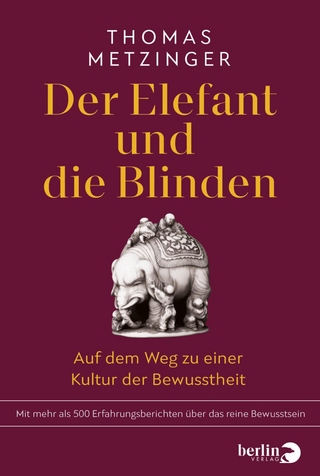
Dead Philosophers' Cafe, The
An Exchange of Letters for Children and Adults
Seiten
2002
University of Notre Dame Press (Verlag)
978-0-268-00894-9 (ISBN)
University of Notre Dame Press (Verlag)
978-0-268-00894-9 (ISBN)
- Titel z.Zt. nicht lieferbar
- Versandkostenfrei innerhalb Deutschlands
- Auch auf Rechnung
- Verfügbarkeit in der Filiale vor Ort prüfen
- Artikel merken
Taking the film ""The Dead Poet's Society"" as his inspiration, Vittorio Hosle creates a place where the great philosophers of antiquity and their modern successors can all meet. They gather in the ""Cafe of the Dead But Ever Young Philosophers"" and discuss eleven-year-old Nora K.'s letters.
Eleven-year-old Nora K. received Jostein Gaarder’s Sophie’s World as a birthday present, and in it she read about Plato’s theory of ideas. One problem especially intrigued her: What about the Platonic idea of the dinosaur? Ideas are timeless and cannot die. The dinosaurs, however, became extinct ages ago. Does the idea of the dinosaur still exist all the same? Could it even be that the material world is a dream and time an illusion? Moreover, is there such a thing as free will, or is everything predetermined? Is the soul eternal? Do animals have a consciousness? Is the universe infinite? Is there such a thing as objective truth? Does God exist, and why is there evil in the world?
These are some of Nora’s questions which prompted her correspondence with Vittorio Hösle, a philosopher by profession, who invents a wonderful philosophical fantasy. Taking the film Dead Poets Society as his inspiration, he creates a place where the great philosophers of antiquity and their modern successors can all meet. They gather in the “Café of the Dead but Ever Young Philosophers” and discuss Nora’s letters—Parmenides and Socrates, Descartes and Hobbes (whom Nora doesn’t like at all), “Mac” (Machiavelli) and Kant, Nora’s “patron philosopher” Giambattista Vico and Hans Jonas, and many others. The sparks fly from time to time, as the great thinkers squabble quite frequently—no wonder, since conflicting arguments from the entire history of philosophy collide with each other head-on.
Nora’s letters are intelligent, never precocious, and always imaginative. Vittorio Hösle provides answers which are entertaining but still critical, and he is clearly concerned about not setting his expectations of the child too low. In his afterword on children’s philosophy and philosophy with children, he sketches what role philosophy could play in raising children. The correspondence with Nora, an authentic exchange of letters between January 1994 and January 1996, is a lovely document of a philosophical friendship between an adult and a child.
The Dead Philosophers’ Café has been widely translated and is now making its first appearance in the English language.
Eleven-year-old Nora K. received Jostein Gaarder’s Sophie’s World as a birthday present, and in it she read about Plato’s theory of ideas. One problem especially intrigued her: What about the Platonic idea of the dinosaur? Ideas are timeless and cannot die. The dinosaurs, however, became extinct ages ago. Does the idea of the dinosaur still exist all the same? Could it even be that the material world is a dream and time an illusion? Moreover, is there such a thing as free will, or is everything predetermined? Is the soul eternal? Do animals have a consciousness? Is the universe infinite? Is there such a thing as objective truth? Does God exist, and why is there evil in the world?
These are some of Nora’s questions which prompted her correspondence with Vittorio Hösle, a philosopher by profession, who invents a wonderful philosophical fantasy. Taking the film Dead Poets Society as his inspiration, he creates a place where the great philosophers of antiquity and their modern successors can all meet. They gather in the “Café of the Dead but Ever Young Philosophers” and discuss Nora’s letters—Parmenides and Socrates, Descartes and Hobbes (whom Nora doesn’t like at all), “Mac” (Machiavelli) and Kant, Nora’s “patron philosopher” Giambattista Vico and Hans Jonas, and many others. The sparks fly from time to time, as the great thinkers squabble quite frequently—no wonder, since conflicting arguments from the entire history of philosophy collide with each other head-on.
Nora’s letters are intelligent, never precocious, and always imaginative. Vittorio Hösle provides answers which are entertaining but still critical, and he is clearly concerned about not setting his expectations of the child too low. In his afterword on children’s philosophy and philosophy with children, he sketches what role philosophy could play in raising children. The correspondence with Nora, an authentic exchange of letters between January 1994 and January 1996, is a lovely document of a philosophical friendship between an adult and a child.
The Dead Philosophers’ Café has been widely translated and is now making its first appearance in the English language.
Vittorio Hösle is Professor of Philosophy at the University of Essen, and Director at the Research Institute for Philosophy in Hannover, Germany as well as Paul Kimball Professor of Arts and Letters at the University of Notre Dame. He is the author of numerous books, including Die Philosophie und die Wissenschaften (1999), Moral und Politik (1997), Philosophiegeschichte und objektiver Idealismus (1996), Philosophie der ökologischen Krise (1994), and Objective Idealism, Ethics, and Politics (Notre Dame Press, 1998).
| Erscheint lt. Verlag | 30.9.2005 |
|---|---|
| Verlagsort | Notre Dame IN |
| Sprache | englisch |
| Maße | 140 x 216 mm |
| Gewicht | 376 g |
| Themenwelt | Schulbuch / Wörterbuch |
| Geisteswissenschaften ► Philosophie ► Geschichte der Philosophie | |
| Geisteswissenschaften ► Philosophie ► Philosophie der Neuzeit | |
| ISBN-10 | 0-268-00894-9 / 0268008949 |
| ISBN-13 | 978-0-268-00894-9 / 9780268008949 |
| Zustand | Neuware |
| Haben Sie eine Frage zum Produkt? |
Mehr entdecken
aus dem Bereich
aus dem Bereich
die kolonialen Wurzeln der französischen Theorie
Buch | Hardcover (2024)
Matthes & Seitz Berlin (Verlag)
28,00 €
oder Das Leben Montaignes in einer Frage und zwanzig Antworten
Buch | Softcover (2023)
C.H.Beck (Verlag)
18,00 €
Auf dem Weg zu einer Kultur der Bewusstheit | Mit mehr als 500 …
Buch | Hardcover (2023)
Berlin Verlag
48,00 €


